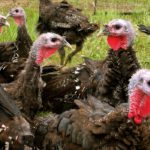COMMUNITY The donation aims to help those in turkey-growing communities hit hard by the pandemic
Rural food banks and cheer boards across the Interlake region received 275 donated turkeys this month. “We want to give back to the community that we are so thankful for, and we hope this contribution helps those in need celebrate the holidays,” said Rachelle Brown, chair of Manitoba Turkey Producers in a Dec. 14 news




